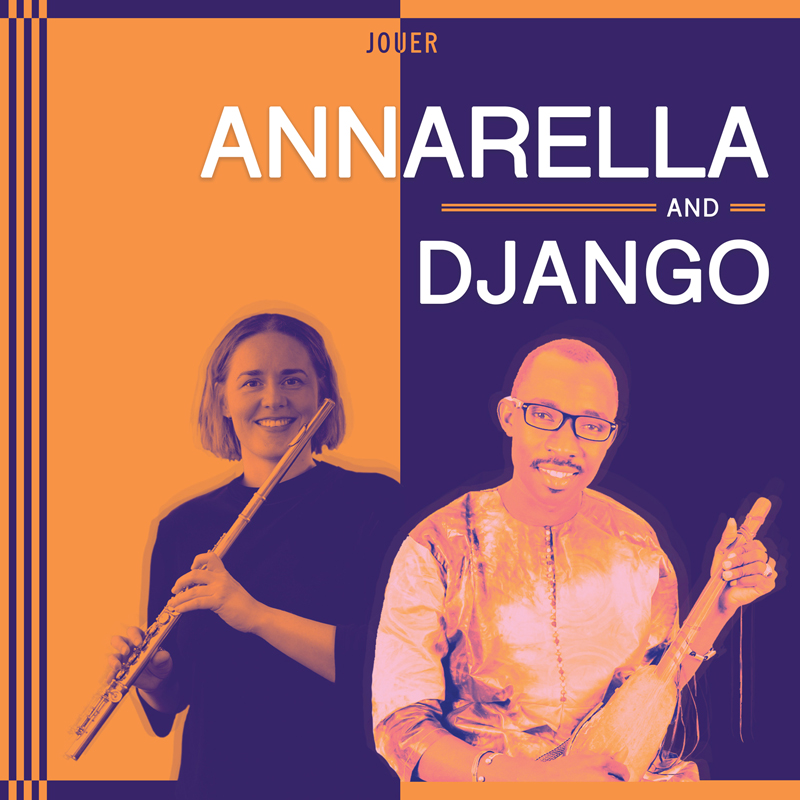Annarella and Django – Jouer (We Are Busy Bodies / Sing a Song Fighter, 2024)
Jouer, the debut album from Annarella and Django explores the intersections between West African and Scandinavian musical traditions. With remarkable fluidity, the duo weaves together griot music, rooted in centuries-old oral traditions of West Africa, with contemplative Nordic jazz and folk music.
The collaboration highlights the talents and musical expertise of Swedish jazz flutist Annarella and Malian ngoni virtuoso Django, a cousin of the legendary kora master Toumani Diabaté.
The album’s title, Jouer (French for “play”) reflects the duo’s improvisational approach, mixing West African rhythms with jazz harmonies. Annarella’s exquisite, melodic flute adds a fresh, expansive quality to the compositions, while Django’s dexterous ngoni lute grounds the music in the griot lineage.
The production, led by Annarella, highlights a delicate balance between structured melody and spontaneous expression.
Jouer features an amalgam of instrumental and vocal tracks, with contributions from several notable artists. Django’s wife, Marietou Kouyaté, adds vocals in Manding and Bambara, while influential Swedish folk musician Ale Möller plays various instruments, including the jaw harp and accordion. The Swedish rhythm section, composed of Lars Fredrik Swahn, Pet Lager, and co-producer Karl Jonas Winqvist, provides a solid and skilled foundation for the album’s diverse sound.


Annarella and Django first crossed paths while touring with Wau Wau Collectif, an Afro-European music project. Their connection grew during informal jam sessions on the road, which inspired them to collaborate across continents. The duo recorded and exchanged tracks over 18 months, crafting the album into a unique musical dialog that concluded in May 2024.
Track descriptions:
“Megaphone” features harmonized male and female vocals, accompanied by a rhythmic intermingling of ngoni and guitar.
“Dakar Örebro” introduces trumpet by Ale Möller, with Django’s vocals interwoven with Annarella’s flute melodies.
“Aduna Ak Asaman” presents Möller’s jaw harp and a handclap-driven groove.
“No More” incorporates a spoken-word sample from economist Richard David Wolff, critiquing capitalism.
“Degrees of Freedom” stands out as the longest track, characterized by a contemplative interplay between flute, clarinet, and piano.
The album reflects a cross-cultural dialog that breaks down musical and cultural barriers. Annarella, who is also training as a psychologist, infuses her music with a playful approach that contrasts with the often-rigid norms of the western classical scene. Django, deeply rooted in Mali’s griot tradition, brings centuries of musical heritage into a contemporary setting.
All music by Annarella Sörlin and Django Diabaté
Annarella Sörlin – flute, keyboards, percussion, acoustic guitar, backing vocals; Django Diabate – ngoni, vocals.
Guests: Lars Fredrik Swahn – bass, guitar, keyboards,backing vocals; Karl Jonas Winqvist – percussion, keyboards, backing vocals; Marietou Kouyaté – vocals on ”Sarajalela”, ”Dakar-Örebrp” and ”Megaphone”.
Ale Möller – shawm (Aduna ak Asaman), trumpet (”Dakar-Örebro”), accordion (”Sarajalela”), clarinet (”degrees of freedom”), jaw harp and melodica (”Pluie Melancholique”); Per Lager – drums and percussion; Kristina Aspeqvist – percussion on ”Hommage..”; Robin Cochrane – balafon on ”no more.”
Produced by Annarella Sörlin
Co-produced by Karl Jonas Winqvist
Recorded, arranged, and mixed by Lars Fredrik Swahn at Pansarmarängen Studio, Stockholm, Sweden.
Additional recordings: ( Django’s ngoni parts and Marietou’s and Django’s vocals) recorded at Moussa§Marra studio, Dakar, Senegal.
Photos by William Wilhelmsson (Annarella) and Azoupy ( Django)
Buy Jouer.


